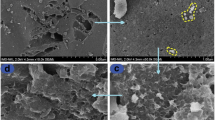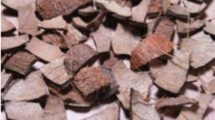Abstract
Ammonium ions are one of the most encountered nitrogen species in polluted water bodies. High level of ammonium ion in aqueous solution imparts unpleasant taste and odor problems, which can interfere with the life of aquatics and human population when discharged. Many chemical methods are developed and being used for removal of ammonium ion from aqueous solution. Among various techniques, adsorption was found to be the most feasible and environmentally friendly with the use of natural-activated adsorbents. Hence, in this study, coconut shell-activated carbon (CSAC) was prepared and used for the removal of ammonium ion by adsorption techniques. Ammonium chloride (analytical grade) was purchased from Merck Chemicals for adsorption studies. The CSAC was used to adsorb ammonium ions under stirring at 100 rpm, using orbital shaker in batch experiments. The concentration of ammonium ion was estimated by ammonia distillate, using a Buchi distillation unit. The influence of process parameters such as pH, temperature, and contact time was studied for adsorption of ammonium ion, and kinetic, isotherm models were validated to understand the mechanism of adsorption of ammonium ion by CSAC. Thermodynamic properties such as ∆G, ∆H, and ∆S were determined for the ammonium adsorption, using van't Hoff equation. Further, the adsorption of ammonium ion was confirmed through instrumental analyses such as SEM, XRD, and FTIR. The optimum conditions for the effective adsorption of ammonium ion onto CSAC were found to be pH 9.0, temperature 283 K, and contact time 120 min. The experimental data was best followed by pseudosecond order equation, and the adsorption isotherm model obeyed the Freundlich isotherm. This explains the ammonium ion adsorption onto CSAC which was a multilayer adsorption with intraparticle diffusion. Negative enthalpy confirmed that this adsorption process was exothermic. The instrumental analyses confirmed the adsorption of ammonium ion onto CSAC.






Similar content being viewed by others
Explore related subjects
Discover the latest articles, news and stories from top researchers in related subjects.Abbreviations
- CSAC:
-
Coconut shell-activated carbon
- ppm:
-
Parts per million
- APHA:
-
American Public Health Association
- q e, q t :
-
Amount of ammonium ion adsorbed (mg/g) at equilibrium and at time‘t’
- C 0, C t :
-
Initial ammonium concentration and ammonium concentration at time t (mg/L)
- V :
-
Volume of solution (L)
- m :
-
Mass of adsorbent (g)
- k 1, k 2 :
-
Pseudofirst order and pseudosecond order rate constants (1/min and g/mg min)
- k p :
-
Intraparticle diffusion model constant (mg/g min0.5)
- t :
-
Time (min)
- K L :
-
Langmuir adsorption constant (L/mg)
- R L :
-
Dimensionless separation factor
- K F :
-
Freundlich constant
- K C :
-
Equilibrium constant
- C A, C S :
-
Amount of ammonium ion adsorbed onto the adsorbent from the solution and at equilibrium
- ∆G :
-
Change in Gibbs free energy (kJ/kmol)
- ∆S :
-
Change in entropy (kJ/kmol K)
- ∆H :
-
Change in enthalpy (kJ/kmol)
- R :
-
Gas constant (8.314 kJ/kmol K)
References
Ali I, Gupta VK (2007) Advances in water treatment by adsorption technology. Nat Protoc 1:2661–2667
Armagan B, Ozdemir O, Turan M, Celik MS (2003) Adsorption of negatively charged azo dyes onto surfactant-modified sepiolite. J Environ Eng 129(8):709–715
Benefield LD, Judkins JF (1982) Process chemistry for water and wastewater treatment. Prentice-Hall, 443–447
Bergero D, Boccignone M, Di Natale F, Forneris G, Palmegiano GB, Roagna L, Sicuro B (1994) Ammonia removal capacity of European natural zeolite tuffs: application to aquaculture waste water. Aquat Fish Manage 25:813–821
Bernal MP, Lopez-Real JM (1993) Natural zeolites and sepiolites as ammonium and ammonia adsorbent materials. Bioresour Technol 43:27–33
Bodalo A, Gomez JL, Gomez E, Leon G, Tejera M (2005) Ammonium removal from aqueous solutions by reverse osmosis using cellulose acetate membranes. Desalination 184:149–155
Booker NA, Cooney EL, Priestly AJ (1996) Ammonia removal from sewage using natural Australian zeolite. Water Sci Technol 34:17–24
Englert AH, Rubio J (2005) Characterization and environmental application of a Chilean natural zeolite. Int J Miner Process 75:21–29
Freundlich HMF (1906) Uber die adsorption in losungen. J Phys Chem 57:385–470
Gupta VK, Ali I (2008) Removal of endosulfan and methoxychlor from water on carbon slurry. Environ Sci Technol 42:766–770
Gupta VK, Rastogi A (2008a) Biosorption of lead (II) from aqueous solutions by non-living algal biomass Oedogonium sp. and Nostoc sp.—a comparative study. Colloids Surf B 64:170–178
Gupta VK, Rastogi A (2008b) Sorption and desorption studies of chromium (VI) from nonviable cyanobacterium Nostoc muscorum biomass. J Hazard Mater 154:347–354
Gupta VK, Rastogi A (2008c) Equilibrium and kinetic modelling of cadmium (II) biosorption by nonliving algal biomass Oedogonium sp. from aqueous phase. J Hazard Mater 153:759–766
Gupta VK, Rastogi A (2009) Biosorption of hexavalent chromium by raw and acid-treated green alga Oedogonium hatei from aqueous solution. J Hazard Mater 163:396–402
Gupta VK, Rastogi A, Dwivedi MK, Mohan D (1997) Process development for the removal of zinc and cadmium from wastewater using slag—a blast furnace waste material. Sep Sci Technol 32:2883–2912
Gupta VK, Mohan D, Sharma S (1998) Removal of lead from wastewater using bagasse fly ash—a sugar industry waste material. Sep Sci Technol 33(9):1331–1343
Gupta VK, Srivastava SK, Tyagi R (2000) Design parameters for the treatment of phenolic wastes by carbon columns (obtained from fertilizer waste material). Water Res 34(5):1543–1550
Gupta VK, Ali I, Suhas MD (2003) Equilibrium uptake and sorption dynamics for the removal of a basic dye (basic red) using low cost adsorbents. J Colloid Interface Sci 265:257–264
Gupta VK, Suhas JS, Ali I, Saini VK (2004) Removal of rhodamine B, fast green, and methylene blue from wastewater using red mud, an aluminum industry waste. Ind Eng Chem Res 43:1740–1747
Gupta VK, Mittal A, Gajbe V, Mittal J (2006) Removal and recovery of the hazardous azo dye acid orange 7 through adsorption over waste materials: bottom ash and de-oiled soya. Ind Eng Chem Res 45:1446–1453
Gupta VK, Ali I, Saini VK (2007a) Adsorption studies on the removal of Vertigo Blue 49 and Orange DNA13 from aqueous solutions using carbon slurry developed from a waste material. J Colloid Interface Sci 315:87–93
Gupta VK, Jain R, Varshney S (2007b) Removal of Reactofix golden yellow 3 RFN from aqueous solution using wheat husk—an agricultural waste. J Hazard Mater 142:443–448
Gupta VK, Ali I, Saini VK (2007c) Removal of fluoride from water by adsorption on carbon slurry: a waste material of fertilizer industry. Water Res 41:3317–3326
Gupta VK, Mittal A, Gajbe V, Mittal J (2008) Adsorption of basic fuchsin using waste materials—bottom ash and deoiled soya—as adsorbents. J Colloid Interface Sci 319:30–39
Gupta VK, Carrott PJM, Ribeiro Carrott ML, Suhas (2009a) Low-cost adsorbents: growing approach to wastewater treatment—a review. Environ Sci Technol 39:783–842
Gupta VK, Mittal A, Malviya A, Mittal J (2009b) Adsorption of carmoisine A from wastewater using waste materials—bottom ash and deoiled soya. J Colloid Interface Sci 335:24–33
Gupta VK, Rastogi A, Nayak A (2010a) Biosorption of nickel onto treated alga (Oedogonium hatei): application of isotherm and kinetic models. J Colloid Interface Sci 342(2):533–539
Gupta VK, Rastogi A, Nayak A (2010b) Adsorption studies on the removal of hexavalent chromium from aqueous solution using a low cost fertilizer industry waste material. J Colloid Interface Sci 342(1):135–141
Gupta VK, Gupta B, Rastogi A, Agarwal S, Nayak A (2011a) A comparative investigation on adsorption performances of mesoporous activated carbon prepared from waste rubber tire and activated carbon for a hazardous azo dye—Acid Blue 113. J Hazard Mater 186:891–901
Gupta VK, Jain R, Saleh TA, Nayak A, Malathi S, Agarwal S (2011b) Equilibrium and thermodynamic studies on the removal and recovery of safranine-T dye from industrial effluents. Sep Sci Technol 46:839–846
Gurses A, Karaca S, Dogar C, Bayrak R, Acıkyıldız M, Yalcın M (2004) Determination of adsorptive properties of clay/water system: methylene blue sorption. J Colloid Interface Sci 269:310–314
Huang H, Xiao X, Yan B, Yang L (2010) Ammonium removal from aqueous solutions by using natural Chinese (Chende) zeolite as adsorbent. J Hazard Mater 175:247–252
Hung CM, Lou JC, Lin CH (2003) Removal of ammonia solutions used in catalytic wet oxidation processes. Chemosphere 52:989–995
Hussain S (2006) Physico-chemical method for ammonia removal from synthetic wastewater using limestone and GAC in batch and column studies. Bioresour Technol 98:874–880
Ji Z, Yuan J, Li X (2007) Removal of ammonium from wastewater using calcium form clinoptilolite. J Hazard Mater 141:483–488
Karadag D, Koc Y, Turan M, Armagan B (2006) Removal of ammonium ion from aqueous solution using natural Turkish clinoptilolite. J Hazard Mater 136:604–609
Kennedy LJ, Selvi PK, Padmanabhan A, Hema KN, Sekaran G (2007) Immobilization of polyphenol oxidase onto mesoporous activated carbons—isotherm and kinetic studies. Chemosphere 69:262–270
Krishna GB, Arunima S (2005) Kinetics and thermodynamics of methylene blue adsorption on neem (Azadirachta indica) leaf powder. Dyes Pigm 65:51–59
Lingyu M, Stuart B, Holt B, Wei-Ping P (2005) Development of an analytical method for distinguishing ammonium bicarbonate from the products of an aqueous ammonia CO2 scrubber. Anal Chem 77:5947–5952
Melcer H, Nutt SG (1988) Nitrogen control of complex industrial wastewaters. J Environ Eng 114:166–178
Narten AH (1970) Diffraction pattern and structure of aqueous ammonium halide solutions. J Phys Chem 74:765–768
Neytzell-DeWilde FG (1977) Treatment of effluent from ammonia plants. SA.113–122
Okada K, Ono Y, Kameshima Y, Nakajima A, MacKenzie KJD (2007) Simultaneous uptake of ammonium and phosphate ions by compounds prepared from paper sludge ash. J Hazard Mater 141:622–629
Ozcan A, Oncu EM, Ozcan AS (2006) Adsorption of Acid Blue 193 from aqueous solutions onto DEDMA-sepiolite. J Hazard Mater 129(1–3):244–252
Sabah E, Turan M, Celik MS (2002) Adsorption mechanism of cationic surfactants onto acid- and heat-activated sepiolites. Water Res 36:3957–3964
Saha D, Deng S (2010) Characteristics of ammonia adsorption on activated alumina. J Chem Eng Data 55(12):5587–5593
Saltali K, Sari A, Aydın M (2007) Removal of ammonium ion from aqueous solution by natural Turkish (Yıldızeli) zeolite for environmental quality. J Hazard Mater 141:258–263
American Public Health Association (1998) Standards methods for the examination of water and waste water, 19th edn.
Ugurlu M, Karaoglu MH (2011) Adsorption of ammonium from an aqueous solution by fly ash and sepiolite: isotherm, kinetic and thermodynamic analysis. Micropor Mesopor Mater 139:173–178
Ugurlu M, Gurses A, Acikyildiz M (2008) Comparison of textile dyeing effluent adsorption on commercial activated carbon and activated carbon prepared from olive stone by ZnCl2 activation. Micropor Mesopor Mater 111:228–235
Veselovskaya JV, Tokarev MM, Grekova AD, Gordeeva LG (2012) Novel ammonia sorbents porous matrix modified by active salt for adsorptive heat transformation: 6. The ways of adsorption dynamics enhancement. Appl Therm Eng 37:87–94
Wang Y, Liu S, Xu Z, Han T, Chuan S, Zhu T (2006) Ammonia removal from leachate solution using natural Chinese clinoptilolite. J Hazard Mater 136:735–740
Wu D, Zhang B, Li C, Zhang Z, Kong H (2006) Simultaneous removal of ammonium and phosphate by zeolite synthesized from fly ash as influenced by salt treatment. J Colloid Interf Sci 304:300–306
Yian Z, Yuntao X, Aiqin W (2012) Rapid and wide pH-independent ammonium-nitrogen removal using a composite hydrogel with three-dimensional networks. Chem Eng J 179:90–98
Acknowledgments
The authors thank the Council of Scientific and Industrial Research, India for its financial support to carry out the present investigation.
Author information
Authors and Affiliations
Corresponding author
Additional information
Responsible editor: Vinod Kumar Gupta
Rights and permissions
About this article
Cite this article
Boopathy, R., Karthikeyan, S., Mandal, A.B. et al. Adsorption of ammonium ion by coconut shell-activated carbon from aqueous solution: kinetic, isotherm, and thermodynamic studies. Environ Sci Pollut Res 20, 533–542 (2013). https://doi.org/10.1007/s11356-012-0911-3
Received:
Accepted:
Published:
Issue Date:
DOI: https://doi.org/10.1007/s11356-012-0911-3




